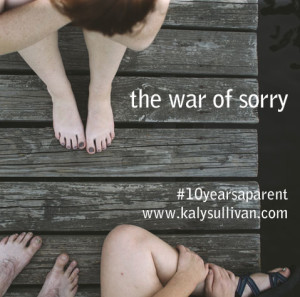There is a battle constantly brewing in our house. There are two sides to every story and this conflict is no different, but it seems that we are in ongoing disagreement about the terms and conditions of saying “I’m sorry.”
Ten years into this occupation and and we’re not any closer to peace than when these children entered our lives. Will we ever be? Or is this war destined to last for the next 8 years?
One side believes you should always say you’re sorry, immediately as soon as you infringe on another person’s emotional or physical well-being. The other side believes that an apology should not be forced, is not always necessary, and can be delivered when the messenger is ready.
Now I will attempt to examine both sides objectively without giving away which side I am on:
Side #1: Always Say You’re Sorry
Premise: It doesn’t matter what you did or didn’t do, if it was an accident or on purpose, it only matters that you hurt another person. You should always express your remorse then and there.
Pros: The more you do something the easier it gets. Learning to say you’re sorry and admitting you made a mistake takes practice. Being a kid is a great time to get in the habit. It’s a life skill that everyone needs to have.
Cons: Forcing an apology diminishes its value. You’re handing out sorry’s faster than Mardi Gras beads. Do you really mean it or is it a reflex? Or is it a get-out-of-jail-free card you’re slinging around to avoid the consequences of your actions? “I said I was sorry….”
Side #2 There’s a Time and a Place for Sorry
Premise: Every situation is different. Sorry can be on a case by case basis and can be delivered when the guilty party is ready.
Pros: The value in an apology is understanding the mistake made. Helping children to assess a situation, understand it, and act accordingly develops their ability for empathy. It’s more meaningful when the apology is fully understood, and an apology isn’t always necessary depending on the circumstances (players involved, environment, barometric pressure).
Cons: Overthinking much? You’re just asking for analysis paralysis dragging out an uncomfortable situation even more. Just do it and get it over with already. And because you haven’t been forced to say you’re sorry, when the right time and situation does come up, you’re not equipped to handle it. The battle becomes about whether or not you should say sorry instead of the fact that you acted like a jerk – which totally derails the whole process.
As you can see, both sides in the War of Sorry have valid points and clear convictions which makes this whole conflict even more confusing.
Negotiations Update:
Although we continue to wage the War of Sorry in our house, it seems the common ground is that saying “I’m sorry,” is something that everyone must learn to do. And since there is no clear cut victor in this battle, we will continue to make the rules up as we go, which has been somewhat effective to date.
#tenyearsaparent is a weekly blog series about what I’ve learned in my first ten years as a parent. Whether you’re a parent nodding in agreement or shaking your head with disgust or a non-parent using these posts as birth control (the surgeon general wants me to tell you that reading blog posts about parenting is not an effective form of birth control), I’ll be spilling the beans on what parenting is really all about.

Leave a Reply